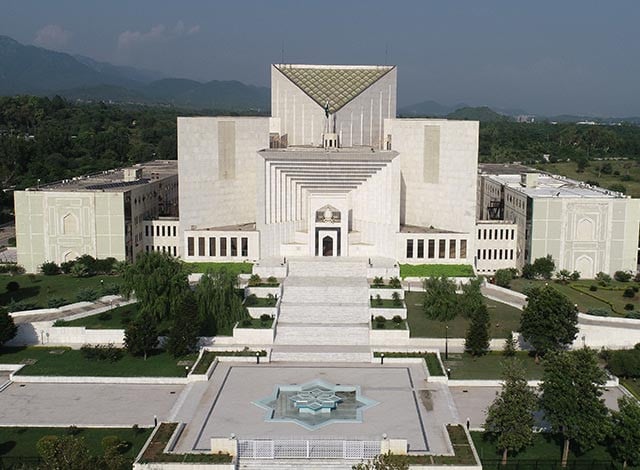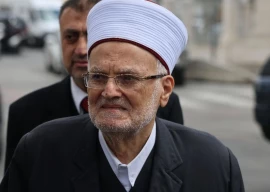
In an unprecedented move, two of the Supreme Court judges, who disagreed with a majority decision in a reserved seats case, have issued their dissenting note prior to the unveiling of the detailed majority orderstating that some provisions of the Constitution need to be suspended in order to allow the PTI get reserved seats in legislatures.
Eight judges of a 13-member full-court on July 12 accepted an appeal filed by the Sunni Ittehad Council (SIC), a party comprising PTI-backed lawmakers, against a Peshawar High Court (PHC) order that upheld an Election Commission of Pakistan (ECP) decision not to grant the SIC reserved seats for women and minorities in legislatures.
The brief majority order had not only resurrected the PTI which could not directly participate in the February 8 general elections after stripping of its election symbol but had also paved the way for its emergence as the largest party in the National Assembly by getting reserved seats.
The majority judges had accepted 39 out of the 80 SIC lawmakers as the PTI members as they had submitted their party affiliation certificates to the ECP ahead of the general election. They had also allowed the remaining 41 lawmakers to join the PTI within 15 days.
Five judges including Chief Justice Qazi Faez Isa, Justice Jamal Khan Mandokhail, Justice Yahya Afridi, Justice Aminuddin Khan and Justice Naeem Akhtar Afghan had disagreed with the majority order.
Two of the judgesJustice Aminuddin Khan and Justice Naeem Akhtar Afghanon Saturday unveiled their 29-page detailed dissenting note.
The note said for creating and carving out relief for the PTI, the SC would have to travel beyond the jurisdiction conferred by Articles 175 and 185 of the Constitution and would also have to suspend Articles 51, 106 and 63 of the Constitution and Section 104 of the Elections Act, 2017 along with the relevant rules.
"We would also have to insert instead of Articles 51, 106 and Section 104. Such articles and sections therein in substitution and in consonance with the relief granted through the majority judgment.
"Previously there was a term used which was 'reading in to the Constitution' or 'reading down the Constitution' but now a new phrase has been introduced that of "inserting new Articles in consonance with the relief to be granted in the peculiar circumstances of the case" in the Constitution."
"We do not have the courage to go to such an extent to give relief to a party who is not before the Court or who did not join the proceedings and pray for such relief.
"All the rules of procedures of proceedings before the Supreme Court and the Supreme Court Rules, 1980 would also have to be ignored as neither any party before the court asked in writing or orally for the relief which has been granted to the PTI," it added.
The judges stated that the majority judgment ignored all rules of procedure, substantive provisions of law and the Constitution. They said relief cannot be granted to the PTI as the PTI neither tried to become a party before the ECP, the PHC or the SC nor was claiming the reserved seats.
"If the said 39 plus 41 persons take any step on the basis of this judgment which is not in accordance with the Constitution they may lose their seats as returned candidates on the basis of violation of the Constitution.
"We are also of the firm view that any other constitutional body cannot be asked to take any steps or decisions which are not permissible under the Constitution. If the said 80 persons change their stance on the basis of the majority judgment, they will be guilty of violating their oath," they noted.
According to the dissenting note, neither the ECP nor any other contesting party denied that 80 independent lawmakers had joined the SIC.
"Even the PTI does not deny this, who then are we to undo all these things and reverse the same and create a new process plus create a new and arbitrary time limit for joining any party of their choice by disregarding the mandate of the Constitution.
"In our view neither Article 62(2), 63 & 63-A have been suspended nor can be suspended, therefore, any affidavit contrary to the provisions of the affidavits already filed will entail the penal consequences of non-seating such members of National Assembly and Provincial Assemblies if he/she files a fresh affidavit in contradiction to his/her previous affidavit and joins any other party.
"Any order of the court which is not in consonance with the constitutional provisions is not binding upon any other constitutional organ of the state," it added.
The minority note also expressed wonder at the delay in unveiling of the majority orderdespite the expiry of the 15 days mentioned therein.
"The delay may render infructuous the review petition filed [by the government] against the order of the court. Therefore, on the basis of the short order we have been compelled to record our findings," the note added.

1722754707-0/BeFunky-collage]_-(16)1722754707-0-270x192.webp)




1722747721-0/BeFunky-collage]_-(10)1722747721-0-270x192.webp)

1722596924-0/BeFunky-collage-(25)1722596924-0-270x192.webp)










COMMENTS
Comments are moderated and generally will be posted if they are on-topic and not abusive.
For more information, please see our Comments FAQ